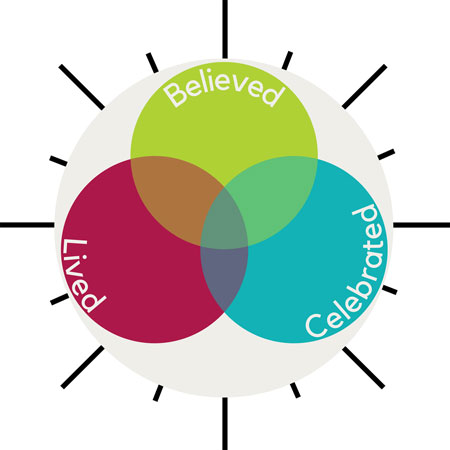
(This column is part of an ongoing series for the U.S. Conference of Catholic Bishops’ Eucharistic Revival initiative.)
By Patrick Schmadeke
The apostolic exhortation “Sacramentum Caritatis” (“Sacrament of Charity”) is divided into three parts, spelling out that the Eucharist is a mystery to be believed, celebrated, and lived. This column is a reflection on the third: the Eucharist is a mystery to be lived.
In this document, retired Pope Benedict XVI said, “a Eucharist which does not pass over into the concrete practice of love is intrinsically fragmented” (#82). Further, he states that “the relationship between the Eucharistic mystery and social commitment must be made explicit … All who partake of the Eucharist must commit themselves to peacemaking in our world scarred by violence and war, and today in particular, by terrorism, economic corruption and sexual exploitation” (#89).
Additional injustices have come into focus since this text was written in 2007, but the basic commitment is the same: participation in the Eucharist commits us to working for justice in the face of injustice. In a world marked by fragmentation and sin, injustice is a part of everyday life.

This opens up the question of the moral life. Morality exists not only as a concept (“do good and avoid evil”), but also as our experience of the lives and loves of actual human hands and hearts. We live out morality in a given context, the time and communities in which we live. This means that living out the Eucharist will not look the same for everyone in every time and place. Rather, living out the Eucharist must be an act of great creativity. New problems require new solutions. While we can learn from old solutions, they were answers to old problems. Inevitably, this makes the old answers insufficient, if not defective.
For example, the old model of disciplining youths through quick referral to detention centers may have been the best solution at one time in history. However, our context has since changed: we know more about childhood development and restorative justice and this knowledge impels us to seek new solutions. Another example: we once could not imagine the world without the death penalty. In recent decades, however, we have come to the gradual awareness of the horror of the act. No one escapes the degradation of the God-given dignity involved, including those involved in the act of execution. We are called to see the face of Jesus in everyone. The death penalty is a neglect of that summons. This knowledge impels us towards new solutions.
The outward expression of love inspired in us by our encounter in the Eucharist is essential in living out the sacrament. “The love that we celebrate in the sacrament is not something we can keep to ourselves. By its very nature it demands to be shared with all” (#84). This love is transformative, it “includes and transfigures every aspect of life” (#71). This love is bound to take us into new horizons and out of our comfort zone.
We must wade into unfamiliar waters. As we allow ourselves to be “formed at the school of the Eucharist” (#91), we become ever more equipped to meet injustice with love. Living out the Eucharist is an expression of the command to love God and neighbor. This focuses our need to be attentive to our concrete experience of daily life. This is the work to which we are all bound.
The work that unfolds in each of our lives will be unique. It will surely look different or deeper than our present expressions of working for justice. Discovering how we can live out the Eucharist can be conversational. We help each other along the way, which keeps our lived expression of Eucharist from becoming individualistic, fragmented, and unrecognizable.
(Patrick Schmadeke is Director of Evangelization for the Diocese of Davenport.)











